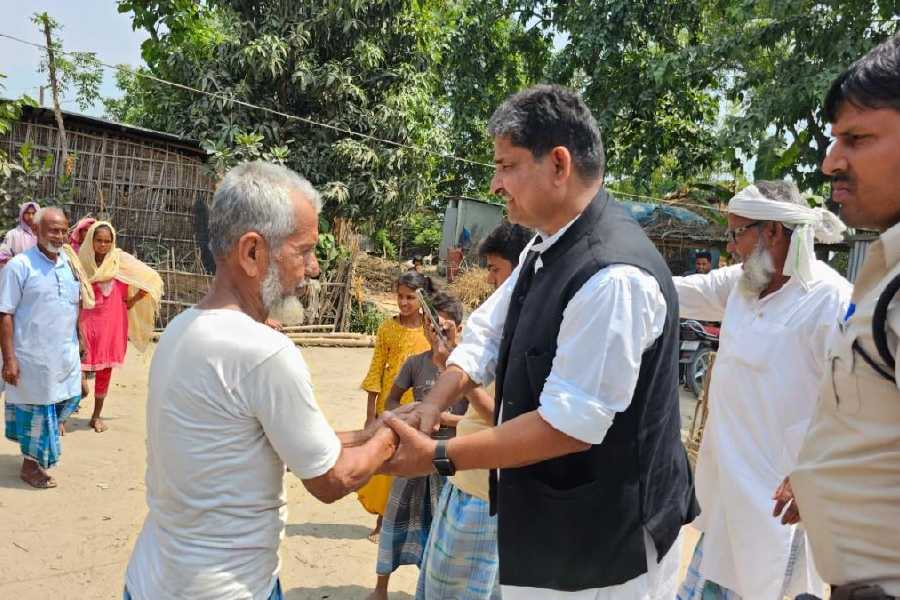It’s not quite “Narendra Modi, who?” but in Kishanganj, the elections are not about Modi, the ubiquitous mascot of the BJP across vast swathes of Bihar and India.
Peace, harmony, amity, brotherhood, humanity take the front seat in the political discussions among the voters, while they dissect the candidates’ past and their suitability for the future. Even development and welfare issues take a back seat.
Tucked away in the northeast corner of Bihar, ravaged annually by floods, Kishanganj is counted among the most economically backward districts in the state. It had a per capita income of Rs 24,942 per annum against the state average of Rs 32,212 in the financial year 2021-22. It stands nowhere near Patna which had a per capita income of Rs 1.15 lakh.
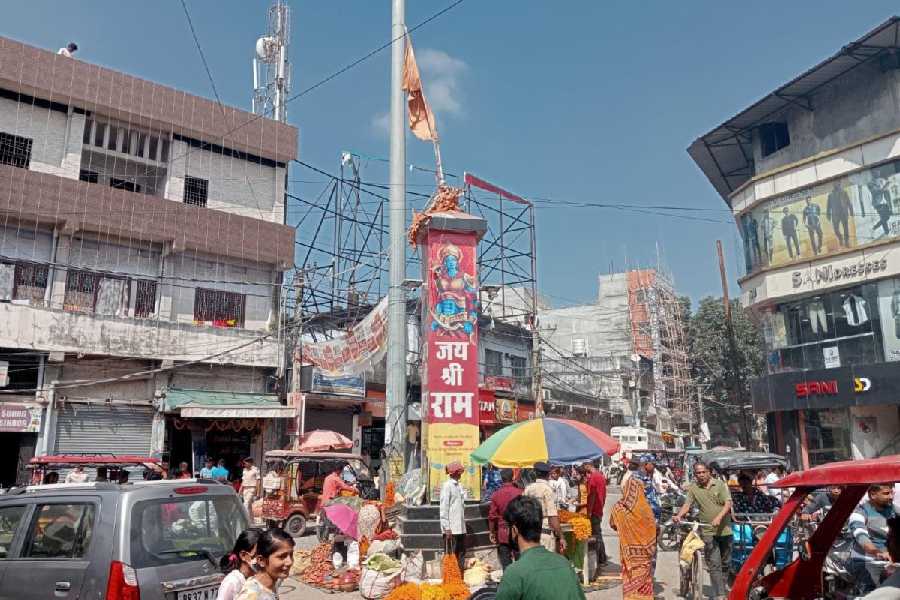
The Gandhi Chowk in Kishanganj town. Picture by Sanjay Choudhary
As per the 2011 census, around 68 per cent of the 17 lakh population here are Muslims — a point often raised by communally oriented political parties to either instilfear among the “Hindu minorities” or to claim “supremacy of the faithful”.
Yet, on the ground, these arguments fall hard.
“We may practise different religions, but we have to live and die together. If this is so, then why fight with each other? Why not stay in peace and harmony? We are Surjapuri Muslims and we prefer this over everything else, even development,” Yaqin Asja a progressive farmer from Janata Haat village on the Baisi-Amour Road, tells The Telegraph.
Away from the rural areas, similar sentiments dominate the people in Kishanganj town, the district headquarters.
“We do get swayed by emotions and vote accordingly. But these emotions are for peace and amity. Development or under-development are not issues here,” says Naseem Akhtar, an advocate at Kishanganj court.
A little distance away, Mohammad Naushad, a small farmer who doubles as a mason, refuses to speak anything about Modi. But neither will he speak about Asaduddin Owaisi and his All India Majlis-e-Ittehadul Muslimeen, which is contesting the seat.
“Naushad must be a Surjapuri Muslim,” laughs Sajal Prasad, professor and head of the department of Hindi literature at Marwari Collegein Kishanganj.
“People do not understand the special traits and divisions among the Muslims in Kishanganj. The Surjapuri Muslims, who speak the Surjapuri dialect, are very amicable and peace-loving. They are hardworking and soft-natured. They constitute around 65 per cent of the Muslims in Kishanganj, and consider themselves to be the natives. They are the reason that we do not find a history of communal strife here,” says Prasad.
The professor points out that Shershahbadis are around 20 per cent of the Muslim population, while the restare Kulhaiya Muslims. Both are considered settlers from outside.
The word Surjapuri refers to the Suryapur kingdom mentioned in the Mahabharata and the Puranas, which spread across parts of Bengal, Bihar, Assam and Nepal regions in ancient times. Other kingdoms followed on theland and Muslim rulers also occupied the area, settled down and became a part of the social fabric.
Tarachand Dhanuka, 85, a social worker and an associate of Acharya Vinoba Bhave, Jayaprakash Narayan, Ram Manohar Lohia and former Nepal Prime Minister Girija Prasad Koirala, heads the Surjapuri Vikas Morcha — which works for the issues and welfare of the Surjapuri-speaking people, which include both Muslims and Hindus.
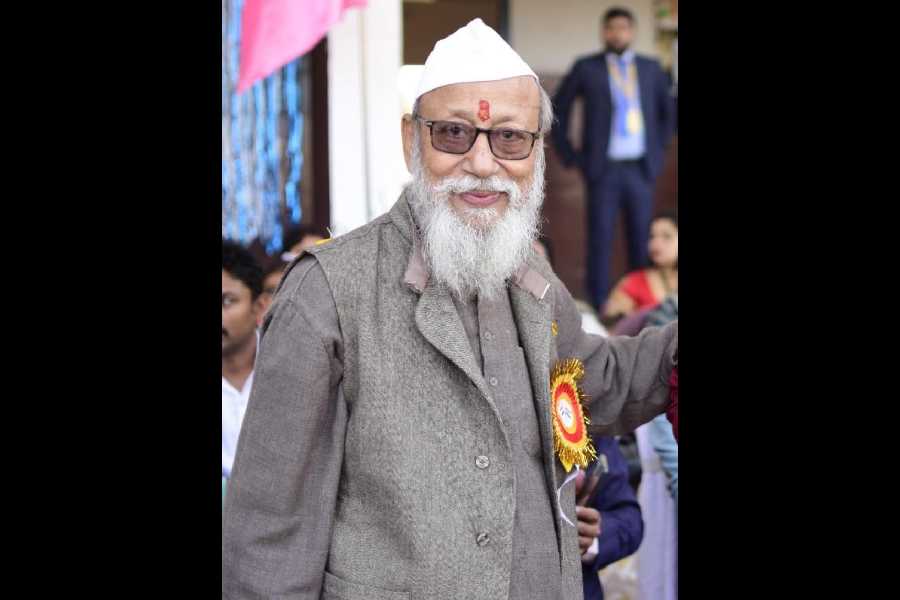
Surjapuri Vikas Morcha president Tarachand Dhanuka. Picture by Sanjay Choudhary
“The Surjapuri Muslims and Hindus are innocent, secular people. Both have the same culture and have a strong bond of brotherhood. It is the hardliners from outside who are trying to drive a wedge between them. They have not succeeded, but they keep trying,” Dhanuka tells The Telegraph.
Though 12 candidates are in the fray in Kishanganj, the contest is actually triangular. The Congress has fielded incumbent MP Mohammand Jawed, chief minister Nitish Kumar’s Janata Dal United (JDU) has put up Mujahid Alam, while the AIMIM nominee is Akhtarul Iman.
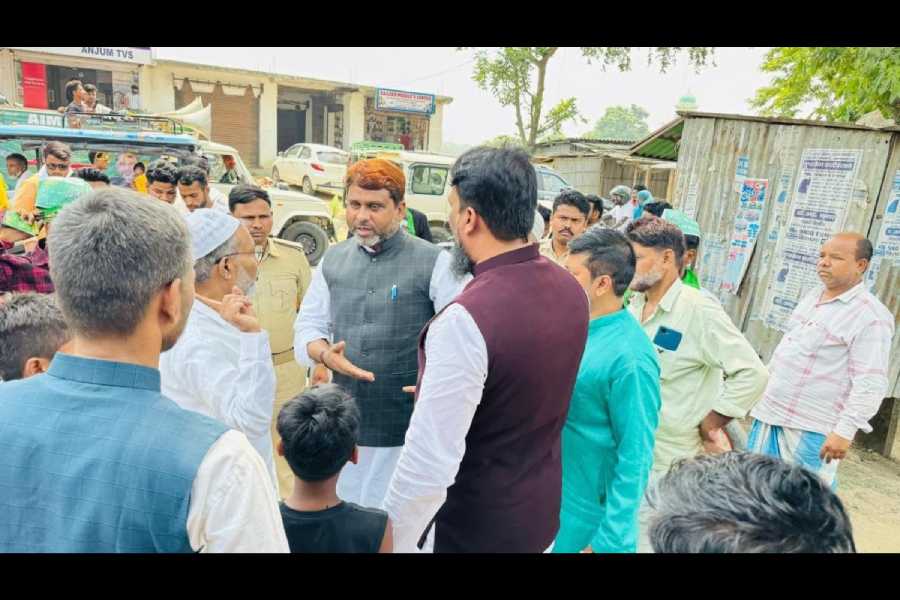
AIMIM candidate Akhtarul Iman canvassing in Kishanganj. Picture by Sanjay Choudhary
Five years ago, Congress’ Jawed had polled 3.67 lakh votes, followed by JDU’s Syed Mahmood Ashraf with 3.33 lakh votes. AIMIM’s Iman secured 2.95 lakh votes.
The contest is expected to be equally close this time as people at tea shops huddle to discuss the strong points of the three candidates.
“Jawed is mild-mannered, peaceful and laid back. His image is of an honest man, who will neither do much work for development nor harm anybody. Alam is the JDU and NDA candidate, prefers working and could ensure development of the constituency. Iman is popular among the youth and also talks about development,” sums up Mohammad Akbar, a teacher in a private school.
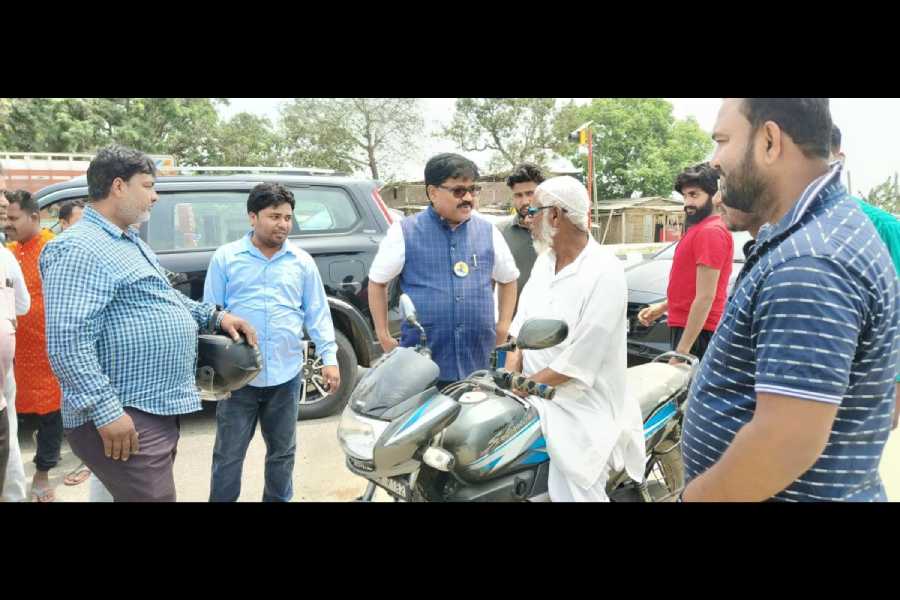
JDU candidate Mujahid Alam campaigning in Kishanganj. Picture by Sanjay Choudhary
Migration for work, agriculture becoming increasingly unprofitable, lack of proper education and health infrastructure, and devastation and erosion caused by the Mahananda and its several tributaries are the major issues.
Kishanganj is known for tea cultivation also. The area under the crop is increasing slowly, but farmers rue the high input costs and lack of government support.
Kishanganj votes on April 26

